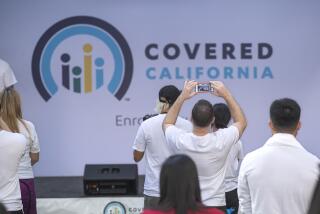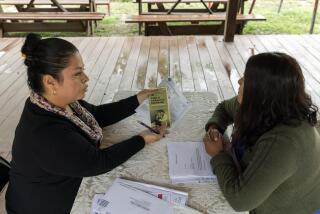More than 4.2 million people sign up for Obamacare
- Share via
WASHINGTON — With less than a month remaining in the first enrollment period, more than 4.2 million Americans have signed up for health insurance on marketplaces created by President Obama’s health law, administration officials announced Tuesday.
The new enrollment report confirms that the administration and its allies probably will fall well short of the 7 million sign-ups that they had hoped to get in 2014.
Administration officials would not even say if they believe they will enroll 6 million people, as projected by the nonpartisan Congressional Budget Office.
The report shows that health insurance sign-ups continued to recover in February from the disastrous launch of the federal HealthCare.gov website, though enrollment in the month also fell short of earlier projections.
More than 940,000 people enrolled in coverage in February.
The sign-up figures overstate actual enrollment because many consumers have not paid their insurance bills. Administration officials have not released figures on the number of paid premiums. Some insurers have reported that as many as 1 in 5 consumers have not yet paid.
Based on the experience of other programs, however, officials and other independent experts expect the rate of sign-ups to accelerate ahead of the March 31 deadline for enrolling in coverage this year.
Administration officials said they don’t believe that they have the authority to extend the March 31 deadline.
Through the first five months of enrollment, California continues to lead all states, with nearly 869,000 people signed up for a health plan through the state’s marketplace, Covered California.
Florida, which is among 36 states that are relying on the federal government to run their marketplaces this year, was second with more than 442,000 sign-ups.
Next are Texas, New York, North Carolina and Michigan.
“We know millions of Americans are finally obtaining the security of affordable health coverage,” Health and Human Services Secretary Kathleen Sebelius said.
The state-based marketplaces — a centerpiece of the Affordable Care Act, also known as Obamacare — enable Americans who do not get health coverage at work to select among plans that offer at least a basic set of benefits. The plans cannot turn away sick people.
Consumers who make less than four times the federal poverty level, or about $94,000 for a family of four, qualify for government subsidies to offset the cost of their premiums.
It remains unclear how many of the people signing up for coverage were previously uninsured, a key measurement for the effectiveness of the landmark 2010 law. But several new surveys suggest that the marketplaces may be having an effect on health coverage.
The share of Americans without insurance dropped in the first two months of 2014 to 15.9%, down from 17.1% in the last three months of 2013, according to a survey of 28,000 Americans by Gallup. The survey’s authors noted that they cannot definitively conclude that the Affordable Care Act caused the change, but the decline started in the last three months of last year, just as the law took effect.
That followed a steady rise in the rate of uninsured beginning in 2008.
The increase in coverage was also most pronounced among the group of Americans targeted by the new law: families and individuals with household incomes below $36,000 a year.
At the same time, consulting giant McKinsey Co., which has conducted four surveys of people who are eligible to sign up for insurance under Obamacare, found that 27% of those who signed up in February using the marketplaces were previously uninsured, up from 11% in its earlier surveys.
More than 4 in 5 people signing up for coverage qualify for subsidies, according to the new Obama administration enrollment report.
Many are also older, with just 27% of those who signed up in February in the coveted 18-to-34 age bracket, well below the 40% target that administration officials have set. Young, healthy consumers are considered crucial to the long-term sustainability of the insurance marketplaces because they help balance risk, keeping insurance premiums in check.
Most experts believe that the youngest and healthiest consumers will wait until the last minute to sign up for coverage.
People who do not have a health plan by the end of open enrollment may be subject to a penalty on their 2014 federal taxes.
More to Read
Inside the business of entertainment
The Wide Shot brings you news, analysis and insights on everything from streaming wars to production — and what it all means for the future.
You may occasionally receive promotional content from the Los Angeles Times.










